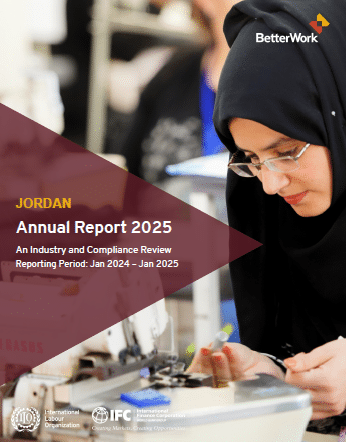Better Work Jordan (BWJ) was established in 2008 at the request of the Government of Jordan (GoJ) and the U.S. government in response to widespread labour rights violations in the country’s garment sector. Since its inception, Better Work Jordan has worked in close collaboration with the Government of Jordan, employers’ and workers’ organizations, development partners, international brands and retailers, to promote decent work and strengthen competitiveness in the sector. Over the past seventeen years, the programme has contributed to meaningful improvements in working conditions, social dialogue, and labour market governance. As of 22 June 2025, BWJ has paused its operations due to a cut in funding.
While Better Work operations are currently paused, the ILO is in ongoing discussions with constituents and stakeholders and remains committed to supporting the sector and is engaging in dialogue on potential opportunities for future collaboration. Better Work continues to strive for an export-oriented garment sector in Jordan that lifts people out of poverty, empowers women, and drives business competitiveness and inclusive economic growth.
In 2010, Better Work Jordan was made mandatory for all garment factories exporting under the United States Jordan Free Trade Agreement (USJFTA). Over the years, the programme has worked to strengthen the capacity of tripartite constituents – government, workers, and employers – to fulfil their mandates in promoting decent work outcomes. BWJ has driven tangible improvement in occupational safety and health, human resource management, gender representation, social dialogue, and migrant workers’ rights. It has played a key role in supporting sectoral stakeholders in negotiating multiple Collective Bargaining Agreements (CBAs) – a significant milestone in the development of industrial relations in Jordan. In 2016, garments produced in Jordan were removed from the TVPRA list, with the programme’s contributions recognised as a key factor in this decision.
In 2018, Better Work Jordan expanded its reach beyond the garment industry to include factories in the plastics, chemicals, and engineering sectors – industries that can export to the European Union (EU) under the Relaxed Rules of Origin (RoO) framework. This expansion aligned with Jordan’s broader economic diversification goals and positioned BWJ as a model for labour reform in other industries.
As a first for Better Work, Better Work Jordan successfully tested an innovative labour inspection secondment programme to build the capacity of labour inspectors to conduct high quality inspections. As its mandate has grown, BWJ became more than a factory-level compliance programme. It evolved into a broader development initiative supporting structural reform, institutional capacity building, and multi-stakeholder collaboration.
In 2022, the programme entered its fourth strategic phase, with a renewed focus on national ownership and long-term sustainability. Phase IV prioritised strengthening the capacity for national stakeholders – government, employers’ and workers’ representatives – to take the lead in monitoring and improving working conditions. It also supported stronger labour market institutions, inclusive economic growth, and the use of data-driven approaches to inform policy and interventions.
During its tenure, Better Work Jordan made important strides in improving working conditions and industrial relations in the country’s manufacturing sector, with a focus on the garment industry. Over this period, the total value of Jordanian garment exports doubled, and the number of jobs created in the sector increased significantly despite the challenging operating environment in the region. At close, the programme had 97 participating factories, of which five were non-garment factories in the plastics, chemical and engineering sectors, reaching 26 brands and retailers.
Better Work Jordan worked to build on its achievements while simultaneously equipping the tripartite constituents to take a leading role in supporting and advancing these achievements. With migrants comprising a large majority of garment workers in Jordan, BWJ encouraged stakeholders to uphold migrant workers’ rights by tackling the issues of pay discrimination, living conditions in worker dormitories and deficient recruitment processes.
In recent years, Better Work Jordan has also worked with other technical teams within the ILO, including experts on occupational safety and health, to equip Ministry of Labor (MoL) inspectors with the skills, tools, and knowledge to undertake factory assessments using Better Work methodology. This initiative resulted in the creation of a Better Work Unit at the MoL tasked with conducting joint inspections with Better Work Jordan staff in the garment, chemical and engineering industries.
